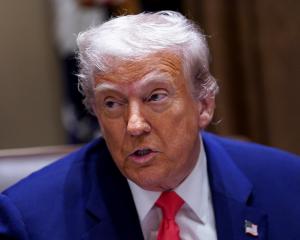
At least 28 people were killed as the four-day death toll neared 110.
The bold ultimatum reflected the growing confidence among the opposition forces - led the Yemen's largest tribe - that they could be gaining the upper hand against Saleh's regime with the uprising shifting from near daily street protests to fast-moving urban combat.
But Saleh also has shown he will not go easily. He has managed to ride out swelling anti-government demonstrations for more than three months, defections of military commanders and pressure from Arab neighbours and Western powers to leave office.
The difference this time for Saleh could be the vast influence of Yemen's main tribes, which command well-armed militias and can tap into traditional clan-based loyalties to try to bring down Saleh's 32-year rule.
In the latest battles, government forces pounded tribal fighters with artillery and mortar rounds even as fighting fanned out around the capital Sanaa to areas that included the airport zone. Hundreds of Yemenis raced out of Sanaa or took refuge in basements to escape mortar strikes.
Fighting also flared in other hotspots around the country, which has the world's most active al-Qaeda-inspired group. But there was no indication of Islamic extremists joining the offensive.
"The tribes are all moving against the president and have a golden opportunity to push Saleh to step down," said Faris Sadqaf, a Yemeni political analyst.
Under Yemen's ancient codes, tribal leaders can declare that members follow their orders above all others. This potentially gives tribal chiefs the power to order government soldiers from their clans to stand down.
There were no apparent signals of mass defections from Saleh's military. But some key commanders have jumped to the opposition, and the leader of Yemen's largest tribe, Sheik Sadeq al-Ahmar, warned that Saleh had the option to step down or be held accountable for "dragging the country to a civil war."
The battles broke out on Monday after an attempt by government forces to storm al-Ahmar's compound in the heart of Sanaa. By Thursday, the clashes had widened to include areas around Sanaa's airport.
At least 109 people have been killed, including at least 28 on Thursday amid differing accounts on the blasts. That is approaching the overall death toll of about 150 since the popular rebellion against Saleh began in February.
Yemen's government said the 28 people were killed on Thursday in an explosion at a weapons storage site. The opposition claimed military forces shelled a building used by tribal fighters loyal to al-Ahmar and other major tribes who have joined him.
The escalating violence prompted the State Department to order non-essential US diplomats and their families to leave the country. Britain said it would scale back its embassy staff, while Germany and other countries issued travel warnings.
British Foreign Secretary William Hague said he was "appalled by the reports of yet more deaths in Sanaa" and urged Saleh to step down. In Paris, US Secretary of State Hillary Rodham Clinton said Saleh has repeatedly "reneged" on promises to step down, and the US and other countries were trying hard to get him out.
Al-Ahmar - whose tribe, the Hashid, were longtime Saleh backers - first played a mediating role between Saleh and leaders of street protests. He turned against the president when security forces began attacks and crackdowns on the marchers.
The loss of Al-Ahmar's support was a stinging blow for Saleh. Al-Ahmar carries enormous clout as a policy-shaper for the country's tribes and as part of a family-linked business network that includes a mobile phone company, a bank and investments in Saudi Arabia and the United Arab Emirates.
But even after abandoning Saleh, the Hashid had kept its militia on the sidelines until government forces moved against Al-Ahmar's compound earlier this week.
Al-Ahmar's forces have laid siege to at least nine government ministries and government troops have responded with mortars and shelling. The targets on Thursday included a TV station owned by al-Ahmar, which was forced off the air by the attack.
Speaking to The Associated Press over the phone from his compound, al-Ahmar urged neighbouring Gulf countries and other nations to boost pressure on Saleh to leave power. He also offered a cease-fire if Saleh takes the first steps to halt the attacks.
But Yemeni authorities responded by escalating their campaign against al-Ahmar with arrest warrants issued against him and other tribal leaders, who represent the country's second- and third-largest clans.
It could be a risky gambit. In total, al-Ahmar and his allies have tribal links to more than half the military and security forces. They would face a difficult test if tribal leaders invoked the traditional code of "nakf," or "the call" in local dialect, which means to set aside other allegiances and follow the tribe's decisions.
"He is the one who started this war. They attacked us on our houses. We didn't start it," said al-Ahmar. "This man doesn't want anything good for Yemen."
Al-Ahmar also claimed Saleh intentionally triggered the current bloodshed in an attempt to portray his regime as the only option to avoid chaos.
"He wants to explode the situation," al-Ahmar said. "He is sending a message to the world: 'Look, if I leave this is the kind of war that will take place.'"
But Saleh has struck a tone of hard-line defiance.
On Wednesday, he vowed he would not step down or allow Yemen to become a "failed state" and haven for al-Qaeda.
"I will not leave power and I will not leave Yemen," said a statement read by Saleh's spokesman. "I don't take orders from outside."
Saleh also threatened that his ouster could turn Yemen into a haven for al-Qaeda - directly touching on US fears that chaos in Yemen could open room for more terrorist footholds. The Yemeni branch of al-Qaeda is linked to the attempted Christmas Day 2009 bombing of an airline over Detroit and explosives found in parcels intercepted last year in Dubai and Britain.
"Yemen will not be a failed state. It will not turn to al-Qaeda refuge," the statement said. Saleh also said he would work to prevent the recent violence from "dragging the country into a civil war."
US President Barack Obama has called on Saleh to transfer power - a change from an administration that once considered the Yemeni ruler a necessary ally against terrorism.
In Washington, a State Department advisory warned the clashes in Yemen's capital "may escalate without notice."
"The security threat level in Yemen is extremely high due to terrorist activities and civil unrest," the advisory said on Wednesday. "There is ongoing civil unrest throughout the country and large-scale protests in major cities."
Hundreds of protesters, meanwhile, camped outside the university in Sanaa, protected by soldiers who have defected to the opposition side.













